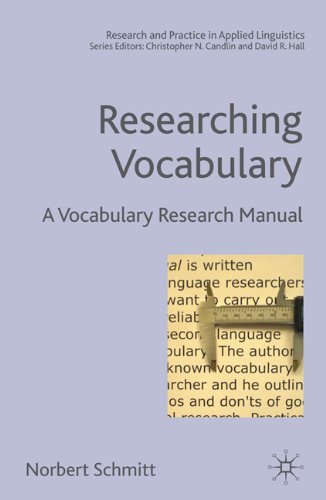

Most ebook files are in PDF format, so you can easily read them using various software such as Foxit Reader or directly on the Google Chrome browser.
Some ebook files are released by publishers in other formats such as .awz, .mobi, .epub, .fb2, etc. You may need to install specific software to read these formats on mobile/PC, such as Calibre.
Please read the tutorial at this link: https://ebookbell.com/faq
We offer FREE conversion to the popular formats you request; however, this may take some time. Therefore, right after payment, please email us, and we will try to provide the service as quickly as possible.
For some exceptional file formats or broken links (if any), please refrain from opening any disputes. Instead, email us first, and we will try to assist within a maximum of 6 hours.
EbookBell Team

4.0
16 reviews
ISBN 13: 9781403985354
Author: N Schmitt
The book overviews a wide range of vocabulary research methodologies, and offers practical advice on how to carry out valid and reliable research on first and second language vocabulary. It includes a Resources section which outlines the lexical tests, corpora, software, internet sites, and other resources available to vocabulary researchers
Part 1 Overview of Vocabulary Issues
Vocabulary Use and Acquisition
Ten key issues
Vocabulary is an important component of language use
A large vocabulary is required for language use
Formulaic language is as important as individual words
Corpus analysis is an important research tool
Vocabulary knowledge is a rich and complex construct
Vocabulary learning is incremental in nature
Vocabulary attrition and long-term retention
Vocabulary form is important
Recognizing the importance of the L1 in vocabulary studies
Engagement is a critical factor in vocabulary acquisition
Vocabulary and reading
A sample of prominent knowledge gaps in the field of vocabulary studies
Part 2 Foundations of Vocabulary Research
Issues of Vocabulary Acquisition and Use
Form-meaning relationships
Single orthographic words and multi-word items
Formal similarity
Synonymy and homonymy
Learning new form and meaning versus 'relabelling'
Meaning
Imageability and concreteness
Literal and idiomatic meaning
Multiple meaning senses
Content versus function words
Intrinsic difficulty
Network connections (associations)
Frequency
The importance of frequency in lexical studies
Frequency and other word knowledge aspects
L1/L2 frequency
Subjective and objective estimates of frequency
Frequency levels
Obtaining frequency information
L1 influence on vocabulary learning
Describing different types of vocabulary
Receptive and productive mastery
Vocabulary learning strategies/self-regulating behavior
Computer simulations of vocabulary
Psycholinguistic/neurolinguistic research
Formulaic Language
Identification
Strength of association - hypothesis tests
Strength of association - mutual information
A directional measure of collocation
Formulaic language with open slots
Processing formulaic language
Acquisition of formulaic language
The psycholinguistic reality of corpus-extracted formulaic sequences
Nonnative use of formulaic language
Part 3 Researching Vocabulary
Issues in Research Methodology
Qualitative research
Participants
The need for multiple measures of vocabulary
The need for longitudinal studies and delayed posttests
Selection of target lexical items
Sample size of lexical items
Interpreting and reporting results
Measuring Vocabulary
Global measurement issues
Issues in writing vocabulary items
Determining pre-existing vocabulary knowledge
Validity and reliability of lexical measurement
Placing cut-points in study
Measuring vocabulary size
Units of counting vocabulary
Sampling from dictionaries or other references
Recognition/receptive vocabulary size measures
Recall/productive vocabulary size measures
Measuring the quality (depth) of vocabulary knowledge
Developmental approach
Dimensions (components) approach
Measuring automaticity/speed of processing
Measuring organization
Measuring attrition and degrees of residual lexical retention
Example Research Projects
Part 4 Resources
Vocabulary resources
Instruments
Vocabulary levels test
Vocabulary size test
Meara's_lognostics measurement instruments
Corpora
Corpora representing general English (mainly written)
Corpora representing spoken English
Corpora representing national varieties of English
Corpora representing academic/business English
Corpora representing young native English
Corpora representing learner English
Corpora representing languages other than English
Parallel corpora
Monolingual corpora
Corpus compilations
Web-based sources of corpora
Bibliographies concerning corpora
Concordancers/tools
Vocabulary lists
Websites
Bibliographies
Important personalities in the field of vocabulary studies
vocabulary books for adults
research vocabulary pdf
researching strategies & tactics vocabulary
research skills vocabulary
researching vocabulary a vocabulary research manual
Tags: N Schmitt, Vocabulary, Research